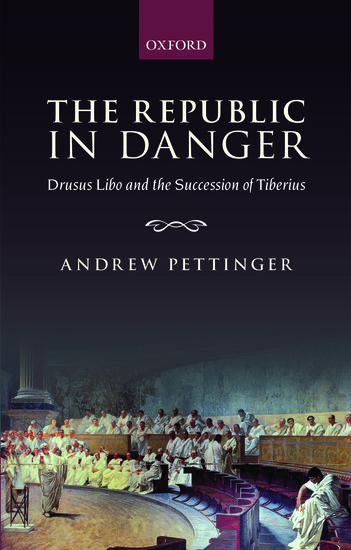By Andrew Pettinger
I was recently invited by Oxford University Press (OUP) to have my book, The Republic in Danger, published on the online open access library OAPEN. After a few general questions, I happily accepted. Why?
OAPEN is an online platform on which books from major academic publishers are freely available to download in as PDFs. Unlike some eBook formats, the PDF is printable and the text can be copied and pasted. Add to these benefits the fact that OAPEN is fully searchable, and it is clear that OAPEN editions have the potential to greatly increase a reader’s ability to interact with a text. OAPEN’s major feature, however, is that the books are free! Users do not need to sign-up to anything, log into anything, or agree to anything — they merely visit the site and download the content of their choice.
As this seems, from the point of view of the author, to be economically irrational, some justification for my decision to participate in OAPEN seems warranted. So, to return to my original question: Why? The answer is related to my desire to publish in the first place.
As a PhD thesis The Republic in Danger did the job. Original, provocative, and most importantly, worthy of the degree for which it was written. Mr Pettinger became Dr Pettinger, my wife was relieved, and I could move on to other things, i.e., paid work. So why publish? Wealth and glory? No. Roman history has its popular appeal, but academic history is a gateway neither to Hollywood nor, generally, a Nobel Prize (Theodore Mommsen being the, now ancient, exception). Furthermore, I am not a paid academic, or aspiring academic, with a quota to meet. I am a civil servant who remains passionately interested in history and committed to the progress of historical knowledge, but without an obvious need to publish. I published because, as I sat in my study and watched the navy blue covered thesis turn dusty grey, the thought of five years of research standing silent and ignored seemed shocking and wrong. No doubt pride was involved, but I believed, and still believe, that The Republic in Danger has important things to say.

This analysis provides evidence for the inherent instability of authoritarian regimes, especially in cultures with a democratic past or aspiration. Augustan Rome is therefore one example of a political system about which we have lately become more aware: Iran, Egypt, and Pakistan are all modern examples, and they are by no means alone. In addition to shedding light on the fragility of Augustan authoritarianism, I also account for its success. Augustus and Tiberius ruled via a delicate combination of violent coercion, dressed always in the garb of constitutional propriety, and a sense that their removal would cause utter ruin. The threat of civil war, famine, and economic turmoil was always made to seem real – and perhaps it was. They were also able to co-opt sections of society and make their satisfaction dependent on the success of the regime. This allowed the regime to rest assured that a great part of the community would rise up to protect it; again, Iran and Egypt are apposite modern examples.
The obligation to share findings with as many people as possible is fundamental to scholarship. Physical books will remain important, but their reach is limited by price and storage. In Australia, and no doubt many other places, libraries are slowly rationalising their collections, whilst the sheer number of books published each year in a given topic, such as Ancient History, makes it impossible for the majority to maintain a private library. OAPEN offers a solution, and in the process offers some advantages. Obviously my giving the book freely away gave me reason to pause, but, in the end, I could not justify my exclusion on the basis of potentially lost profits (I should point out that the effect on profit is not yet known, either way). OAPEN’s audience is global and, importantly, unrestrained by anything save their ability to access the internet. I could not ignore such massive potential. To do so would undermine my reason for publishing in the first place. Ultimately, societies which are truly free are built on nothing more secure than ideas freely exchanged, and in that formulation, scholars are duty bound to disseminate their work as widely and efficiently as possible.
Andrew Pettinger is currently an Associate of the Classics and Ancient History Department at the University of Sydney and works as a federal public servant. He is the author of The Republic in Danger: Drusus Libo and the Succession of Tiberius; an open access version of this publication is made available by OUP as part of the OAPEN-UK project.
Oxford University Press (OUP) is participating in OAPEN-UK, a pilot funded by JISC Collections and the Arts and Humanities Research Council (AHRC) to gather evidence on the viability of open access monographs in the humanities and social sciences. Our participation is running for the duration of the final year of the trial, from September 2013 – September 2014.
Subscribe to the OUPblog via email or RSS.
Subscribe to only media articles on the OUPblog via email or RSS.
Image credit: Portrait of Roman Emperor Tiberius. Public domain via Wikimedia Commons.




[…] to share findings with as many people as possible is fundamental to scholarship.’ You can read his blog online on the OUP […]
I have just had a look at your book, which I would not have done if I had to pay 50 dollars for it. I haven’t read the whole thing but I like your ideas. So thank you!
I believe treating knowledge as a commodity to be bought and sold is made unnecessary by the internet, and indeed it is a most pernicious burden on the advancement of culture and learning.